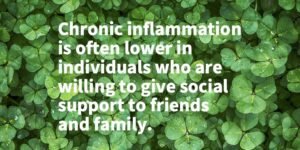Social Support Helps Reduce Inflammation
You’ve likely heard the adage, “tis better to give than to receive”. This is often true when it comes to being a support to someone. New research out of OSU finds that providing support to family and friends is just as impactful as receiving it.The researchers discovered that chronic inflammation, an indicator of health, was lower in individuals who claimed they were open and willing to giving social support to friends and family.Having supportive friends is beneficial but being a support may also help your own health. In those who believe they can offer more support in relationships, inflammation is reduced, according to Tao Jiang, OSU psychology doctoral students and lead author of the study.Early evidence suggests that the association between the ability to help others and health may be especially vital to women. Jiang’s research was done with Professor Jennifer Crocker, Baldwin Way, an associate professor and Syami Yakin, a research assistant. All are in the psychology department at OSU.The study is featured in the journal Brain, Behavior and Immunity. Results indicate that the nourishing power of healthy relationships comes from the support being mutual. Way states, "It may be that when people believe they can give more support to friends and family, these relationships are especially rewarding and stress-relieving, which reduces inflammation," he said.The research utilized data in over 1,050 subjects from the National Survey of Midlife Development in the US. Participants were healthy adults between the ages of 34 and 84.Questionnaires were done that measured the participant’s "social integration,". These questions asked about marital status, living with a partner and how frequently they reached out to family and friends. Time spent attending social events and group activities was also requested.Subjects were also asked about how much they thought they could rely on family, friends or their spouse if they needed assistance.Jiang notes that the difference with this research was that participants were asked to rate how much they were available to support family, friends or their spouse.At the two-year mark, subjects came back for blood tests, including a test for interleukin-6 (IL-6)- a marker for systemic inflammation in the body.IL-6 is important since elevated levels are linked with an increase for several diseases including cardiovascular disease and cancer. "Higher levels of IL-6 are associated with increased risk for many of the diseases that are the top killers of Americans, including cardiovascular disease and cancer," Way said.The researchers believed it necessary to figure out why past research found weak evidence for the association between social support and lower inflammation.The results showing the importance of being open to help others stayed true even after accounting for other factors that could impact inflammation such as age, income, education, health behaviors, drug use and diagnosed medical conditions.After evaluating the data, the connection between social support and inflammation was mainly found in females according to Jiang. He notes that social relationships are often considered more important to women, but the sample size wasn’t large enough to reflect this conclusively. More research is needed.Way noted that the research only observed what individuals said they were willing to do, not what they actually did. The study does provide a context for the link between relationships and health.Below are ways men and women can stay connected and offer support to others in need:• Phone a friend or family member regularly. This is especially important for elderly individuals that may experience isolation.• Send a card to a friend or family member. This helps to maintain relationships when face to face communication isn’t possible.• Do random acts of kindness. Research supports positive relationships in reducing risk for heart disease.2• Volunteer your time. Helping others in need may improve your overall wellbeing.• Be a good listener. When friends or family are in need, they often just want someone to hear them.By Lisa Andrews, MEd, RD, LDPDF Handout: Inflammation Findings References:
References:
- Tao Jiang, Syamil Yakin, Jennifer Crocker, Baldwin M. Way. Perceived social support-giving moderates the association between social relationships and interleukin-6 levels in blood. Brain, Behavior, and Immunity, 2022; 100: 25 DOI: 10.1016/j.bbi.2021.11.002
- Hernandez R, Cheung E, Carnethon M, Penedo FJ, Moskowitz JT, Martinez L, Schueller SM. Feasibility of a culturally adapted positive psychological intervention for Hispanics/Latinos with elevated risk for cardiovascular disease. Transl Behav Med. 2018 Nov 21;8(6):887-897. doi: 10.1093/tbm/iby045. PMID: 29796632; PMCID: PMC6248863.
